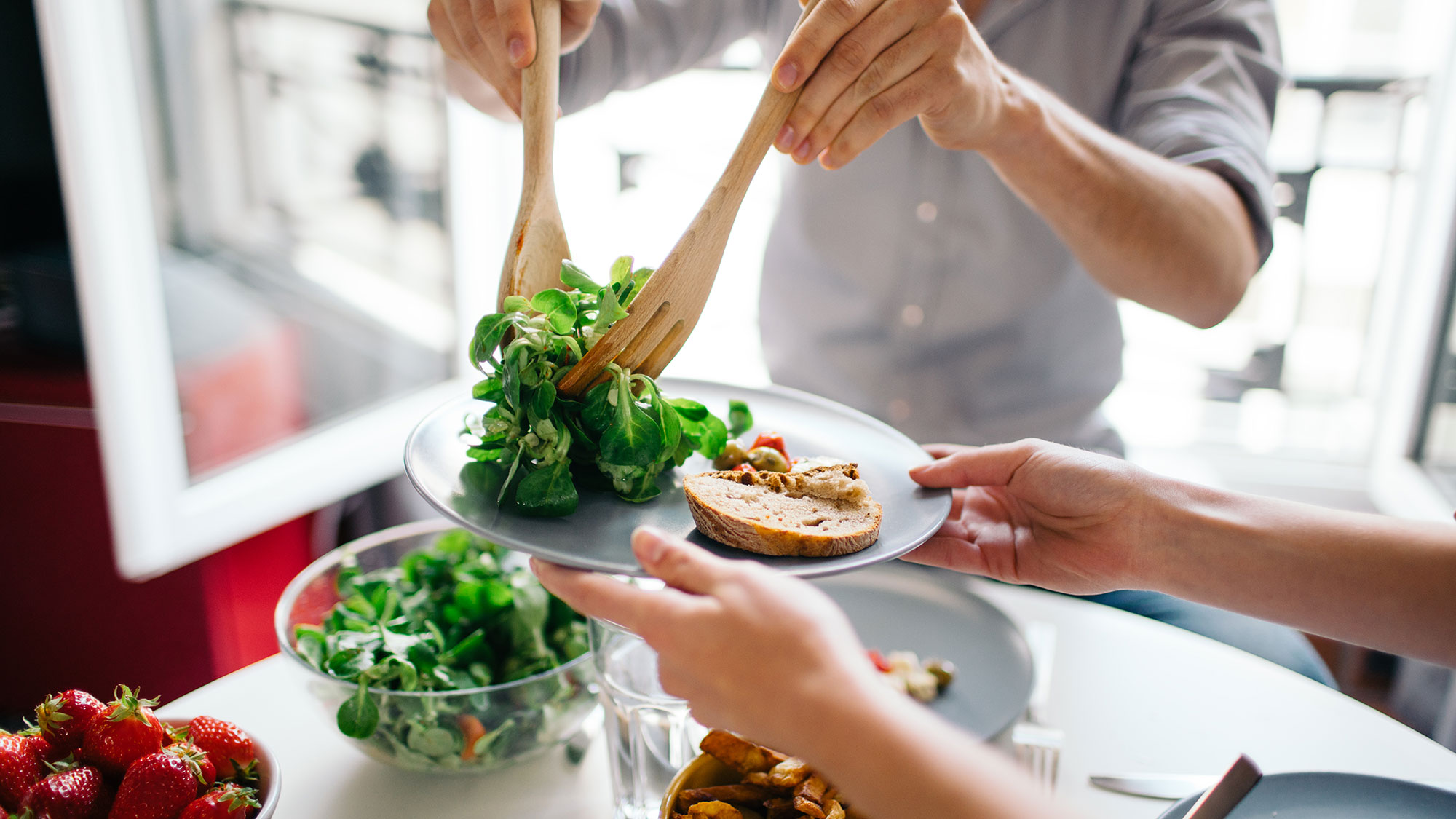Six telltale signs that your diet needs to change
From low sex-drive to brain drain, these key signs could mean your diet is in need of a change


Start your week with achievable workout ideas, health tips and wellbeing advice in your inbox.
You are now subscribed
Your newsletter sign-up was successful
Wondering whether your diet is up to scratch? From low sex-drive to brain drain, these key signs could mean you’re in need of a change.
Our bodies are very much like cars. When the oil, battery or electronics symbol lights up on your dashboard, it indicates a potential fault in the vehicle that requires your attention.
In a similar way, your body is constantly communicating its needs, giving outward signs when things need fixing from within. By listening to what your body is saying and giving it the right nourishment, you’ll soon have it running like a well-oiled machine.
You've got brain fog
Struggling to concentrate or finding yourself forgetful? To keep your brain working in peak condition it needs fuelling with the right nutrients. Studies show that about nearly 60 percent of the human brain is made of fat, so it makes sense that ensuring an adequate intake of fatty acids will benefit this major organ.
According to a study published in the Journal of Biomedical Science, omega-3 fatty acids are particularly effective in protecting brain cells and increasing memory. Fatty fish like salmon, trout and sardines are all rich food sources of omega-3 fatty acids, and WHO recommends that people eat 1-2 portions of oily fish a week (the UK's NHS recommends at least one).
For those who don't or can't meet this quota, supplements can help – see our guide on how to select the best fish oil supplements to boost your omega-3. They include an option that's suitable for vegans, who may also be interested in our list of vegan sources of omega-3.
You have constant food cravings
Increased food cravings can often be a side effect of restrictive diets, according to a study published in the International Journal of Eating Disorders, which investigated the relationship between food deprivation and subsequent intake.
Start your week with achievable workout ideas, health tips and wellbeing advice in your inbox.
When deprived of foods like chocolate, restrained eaters experienced increased food cravings and were more likely to eat the craved food, suggesting that moderation - rather than deprivation - is key.
It’s also worth checking your hydration status, too. Research from the journal Obesity found that drinking water before meals can help reduce cravings and appetite, as well supporting with weight loss. So keep a flask of water (perhaps one of our best water bottles for the gym picks) close at hand, and take regular sips throughout the day.
You're an emotional wreck
It will come as no surprise to learn that what we eat has a huge bearing on our mood. If you’re finding your mood is fluctuating, try upping your intake of leafy greens like spinach, kale, cabbage or watercress.
Leafy greens are an excellent source of the B-vitamin folate, which has consistently been associated with having anti-depressant qualities. A meta-analysis of studies in the Journal of Psychiatric Research found that people with depression had lower blood levels of folate and lower dietary intake of folate compared to those without depression.

Research also shows that not eating enough fat increases the risk of depression, irritability and anger. In a study from the British Journal of Nutrition, researchers found that when participants cut their dietary fat intake from 41% of total energy to 25%, it had an adverse effect on their mood, with significant increases in anger, hostility, tension and anxiety.
Another long-term study, published in the journal PLoS One, assessed over 12,000 people over a period of 10 years and found that men and women on low-fat diets were 26 percent and 37 percent more likely to be depressed after one year.
But when it comes to increasing your dietary fat intake, give trans fats (typically found in processed foods such frozen pizzas, margarine and fried foods) a wide berth. Research from the University of California San Diego linked trans fat consumption with increased aggression and irritability.
Saturated fats (meat products such as sausages, butter, cheese, cakes and pastries) should also be kept to a minimum - less than 10% of daily calorie intake, according to the latest Dietary Guidelines for Americans. Instead, look to eat a healthy amount of saturated fats, found mostly in oils from fish and plants such as avocados, pumpkin and sesame seeds, and nuts including almonds, hazelnuts, and pecans.
Your body doesn't heal quickly
When your body builds new tissue to replace damaged ones, certain nutrients are key to maximizing tissue strength, boosting recovery time and fighting off any potential infections. One of these nutrients is protein.
In a study from Penn State University, researchers found that eating more protein after an injury can help speed up recovery, which is particularly vital as according to a study published in the British Journal of Nursing, when you have a cut or wound, you lose protein from the secretions.
Another key nutrient to focus on if your recovery time is slow is zinc, which is a component of many enzymes needed for wound healing, tissue repair and growth. Regularly consuming zinc-rich foods like shellfish, seeds and nuts can really ramp up your recovery time. In fact, a study in the Journal of Research in Medical Sciences showed that not getting enough zinc from your diet can actually delay wound healing.
You've lost your libido
If you are struggling to get fired up in the bedroom, your diet could be a potential contributor. According to a study from the International Journal of Eating Disorders, malnutrition can lead to a loss of libido as well as causing sexual anxiety. A nutrient-rich, whole-food diet is the best way to provide your body with everything it needs for a healthy sex life. In one study published in the Journal of Sexual Medicine, women who followed a Mediterranean diet had the lowest prevalence of sexual dysfunction.
- Best vitamins for women over 50: what to look for — and avoid
- Best menopause supplements to help overcome common symptoms
Research also reveals that certain foods can offer a libido boosting effect. Maca, a sweet root vegetable, is commonly used in South America to boost fertility. Several studies, including one in the journal Ethnopharmacology reported that after consuming maca, participants experienced enhanced sexual desire. Other foods to help put you in peak performance include, red ginseng, fenugreek, oysters, saffron and pistachio nuts. In one study, men who consumed 100g of pistachio nuts per day for three weeks experienced increased sexual function as well as improving blood lipid levels.
You're struggling to lose weight
It can be very frustrating when your weight loss stalls, especially if you feel like you’re ticking all the right diet and exercise boxes. If you've hit a weight loss plateau despite eating clean and exercising, research suggests that raising the levels of good bacteria in your gut with probiotics could help.
In a pooled review of studies published in the journal Nutrition and Metabolism, researchers found that, in particular, the Lactobacillus and/or Bifidobacterium strains reduced abdominal fat and overall body weight, as well as having a boosting effect on metabolism.
Angela has been a health writer for over 10 years, contributing to a range of online and print publications including Women's Health, Women's Fitness, Your Fitness, Top Santé, Healthy, and Good Housekeeping. She writes about all aspects of health and wellbeing, with a special interest in nutrition and the therapeutic application of food. A qualified nutritionist and a recipe developer, she is the founder of Dara Dara Nutrition and has developed recipes for titles including GoodtoKnow. In her spare-time she likes to throw netballs, hula hoops and yoga poses (or what poses as yoga!) and has recently taken to the bass guitar. Fortunately for her neighbors, she’s invested in some headphones.
